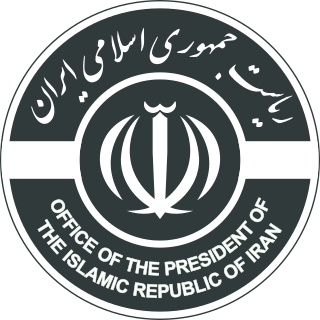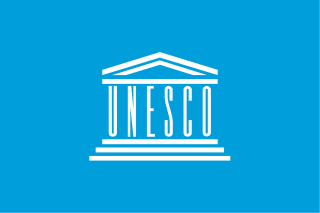The Roman Curia comprises the administrative institutions of the Holy See and the central body through which the affairs of the Roman Catholic Church are conducted. The Roman Curia is the institution which the Roman Pontiff ordinarily makes use of in the exercise of his supreme pastoral office and universal mission in the world. It is at the service of the Pope, successor of Peter, and of the Bishops, successors of the Apostles, according to the modalities that are proper to the nature of each one, fulfilling their function with an evangelical spirit, working for the good and at the service of communion, unity and edification of the Universal Church and attending to the demands of the world in which the Church is called to fulfill its mission.

The International Union for Conservation of Nature (IUCN) is an international organization working in the field of nature conservation and sustainable use of natural resources. Founded in 1948, IUCN has become the global authority on the status of the natural world and the measures needed to safeguard it. It is involved in data gathering and analysis, research, field projects, advocacy, and education. IUCN's mission is to "influence, encourage and assist societies throughout the world to conserve nature and to ensure that any use of natural resources is equitable and ecologically sustainable".

The president of Iran is the head of government of the Islamic Republic of Iran. The president is the second highest-ranking official of Iran after the Supreme Leader.

The Department for Culture, Media and Sport (DCMS) is a department of His Majesty's Government, with responsibility for culture and sport in England, and some aspects of the media throughout the UK, such as broadcasting. Its main offices are at 100 Parliament Street, occupying part of the building known as Government Offices Great George Street.

Payame Noor University is a public university university in Iran, with its headquarters in Tehran. Established in 1988, is a legal body under the Ministry of Science, Research and Technology. Payame Noor means "the message of light" in Persian.
The Cabinet of Ministers of Ukraine, commonly referred to as the Government of Ukraine, is the highest body of state executive power in Ukraine. As the Council of Ministers of the Ukrainian SSR, it was formed on 18 April 1991, by the Law of Ukrainian SSR No.980-XII. Vitold Fokin was approved as the first Prime Minister of Ukraine.

The Government of Punjab is the provincial government of the Pakistani province of Punjab. It is based in Lahore, the provincial capital. Its powers and structure are set out in the provisions of the Constitution, in which 41 districts come under its authority and jurisdiction. The government includes the cabinet, selected from members the Punjab Provincial Assembly, and the non-political civil staff within each department. The province is governed by a unicameral legislature with the head of government known as the Chief Minister. The Chief Minister, invariably the leader of a political party represented in the Assembly, selects members of the Cabinet. The Chief Minister and Cabinet are thus responsible for the functioning of government and are entitled to remain in office so long as it maintains the confidence of the elected Assembly. The head of the province is known as the Governor, appointed by the federal government, on behalf of the President, while the administrative boss of the province is Chief Secretary Punjab.

The International Programme for the Development of Communication is a United Nations Educational, Scientific and Cultural Organization (UNESCO) programme aimed at strengthening the development of mass media in developing countries.
The German Commission for UNESCO is one of 195 National Commissions for UNESCO worldwide, a unique structure in the UN system, foreseen by UNESCO's constitution of 1946. The German Commission was founded on May 12, 1950, one year before West Germany was officially admitted to UNESCO. It has a liaison function for German Multilateral Foreign Cultural Policy; thus, its regular budget is financed by the Foreign Office. It is a chartered non-profit voluntary association with up to 114 members: Its members represent the German Federal government and the governments of the Laender, representatives of important German institutions working within UNESCO's fields of competence as well as individual experts.

The United Nations Educational, Scientific and Cultural Organization (UNESCO) is a specialized agency of the United Nations (UN) with the aim of promoting world peace and security through international cooperation in education, arts, sciences and culture. It has 194 member states and 12 associate members, as well as partners in the non-governmental, intergovernmental and private sector. Headquartered in Paris, France, UNESCO has 53 regional field offices and 199 national commissions.

Constitution Avenue, also known as Shahrah-e-Dastoor, is a major north-south avenue in Islamabad, Pakistan that passess through the Red Zone. Its north end meets with the Khayban-e-Iqbal intersection and south end with an intersection of Srinagar Highway.

Saied Reza Ameli is a (full) professor of communication at the University of Tehran. He is currently a member of Department of Communications and the director of the UNESCO Chair on Cyberspace and Culture, and Cyberspace Policy Research Center, Faculty of World Studies at the University of Tehran. Over the past decade, Ameli has been working on issues of Muslim minority identity in the West, and Muslim minority rights in UK, France and the U.S. He also serves as the editor-in-chief of Journal of Cyberspace Studies. He was also Secretary of Supreme Council of the Cultural Revolution. He is the member of Supreme Council of Cyberspace and Supreme Council of the Cultural Revolution.

The Government of the Islamic Republic of Iran, known simply as Nezam, is the ruling state and current political system in Iran, in power since the Iranian Revolution and fall of the Pahlavi dynasty in 1979.

Climate change education (CCE) is education that aims to address and develop effective responses to climate change. It helps learners understand the causes and consequences of climate change, prepares them to live with the impacts of climate change and empowers learners to take appropriate actions to adopt more sustainable lifestyles. Climate change and climate change education are global challenges that can be anchored in the curriculum in order to provide local learning and widen up mindset shits on how climate change can be mitigated. In such as case CCE is more than climate change literacy but understanding ways of dealing with climate
Science and technology in Tanzania describes developments and trends in higher education, science, technology, innovation policy, and governance in the United Republic of Tanzania since the turn of the century.
The National Information Network (NIN) (Persian: شبکۀ ملی اطلاعات, Shabake-ye Melli-ye Ettelā'āt), also known as National Internet in Iran and the Iranian intranet, is an ongoing project to develop a secure, stable infrastructure network and national intranet in Iran.
The Iran Technical and Vocational Training Organization or in brief I.R.T.V.T.O is one of the organizations affiliated to the Ministry of Cooperatives, Labour, and Social Welfare, which was formed from the merger of three educational institutions in 1980 in order to provide technical and vocational education. In addition to the central headquarters, this organization has 31 general administrations in provinces of Iran, an instructor training center, 552 Learning Center and over 11700 free technical and vocational schools. In order to achieve the latest science and technology news and to comply with international standards, the organization always tried to expand international relations, including with the International Labour Organization (ILO) and the International Organization for Vocational Training in other countries. In this regard, the organization, regardless of the interpretation of the overall organizational structure, carries out its activities only in the field of education, with the support of the research field.
The Iranian National Tax Administration or in brief INTA is one of the organizations affiliated to the Ministry of Economic Affairs and Finance in Iran which is responsible for handling the country's tax affairs. Among the tasks of this organization are reforming and mechanizing the country's tax system and implementing Value-added tax.

Pursuant to Article 44 of the Law on Internal Regulations of the Islamic Consultative Assembly, the Article 90 of the Constitution Commission of the Islamic Consultative Assembly is formed in order to organize and streamline the Assembly and the representatives, especially in relation to the work of the Executive, Judiciary and Parliament branches, based on various articles of the constitution, especially its ninetieth article. The structure of the members of this commission is as follows:
- One representative from each specialized commission of the Assembly
- Eight representatives elected by the heads of branches and the board of directors of the Assembly as permanent members

The Act to confronting the hostile actions of the Zionist regime against peace and security is a plan that was passed on May 20, 2020 by the Islamic Consultative Assembly in accordance to the Article 123 of the Constitution of the Islamic Republic of Iran. The Act is a comprehensive plan including 16 articles to counter the hostile actions of the Zionist regime against the people of Palestine, Islamic countries and the Islamic Republic of Iran. The Act refers to the destructive role of the illegitimate regime of Zionist in disrupting regional and international peace and security and widespread and systematic violation of the human rights.












